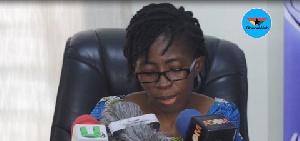There is an increase in Sexual and Gender-Based Violence (SGBV) among refugees living in the country, the Ghana Refugee Board (GRB) has said.
According to the board, SGBV cases rose from 17 in 2015 to 41 in 2016.
The Eligibility and Protection Officer of the Ghana Refugee Board, Doris Tagoe, made the revelation at a press conference in Accra on Tuesday, 20 June, 2017, as part of activities to mark this year's International Day for the Elimination of Sexual Violence in Conflict and World Refugee Day.
GRB called on government and other stakeholders to help improve the lives of refugees in the country and the world at large.
According to statistics, there are some 11,865 refugees and some 1,371 asylum seekers, making it a total of 13,236, currently living in camp settlement across the country.
Ms Tagoe noted that there is an increase in sexual and gender-based violence reported in all the refugee camps across the country.
She disclosed: “In 2015, 17 SGBV incidents were reported among persons of concern even in the refugee camps located in the Western and Central regions in spite of numerous training sessions undertaken for all parties involved in prevention and response to SGBV... Out of the 17 incidents reported, seven incidents involved children survivors including cases of defilement. One case was successfully brought to court by the victim and her legal representative resulting in a guilty sentence for the perpetrator. Another case submitted to court could not be concluded as the alleged perpetrator absconded before trail.
“In 2016, a higher number of SGBV cases were reported on all four camps. There were 27 cases for adults and 14 cases for victims under 18 years. This brings the total number of cases reported on all four camps to 41. The victims comprised 35 females and six males.”
Ms Tagoe noted that although there has been some improvement in the rate of response on the part of government officials regarding SGBV cases, the redress process is slow and there are still challenges with legal representation and existing legal aid services.
“On the whole, structures and procedures have been established in all the refugee camps to address SGBV incidence and support survivors to seek redress while perpetrators are reported and handed over to the security institutions for appropriate punishment,” she added.
General News of Tuesday, 20 June 2017
Source: classfmonline.com
Sexual violence against refugees rising
Entertainment
















